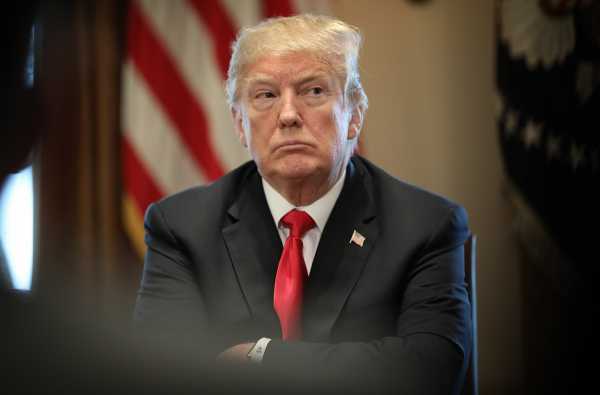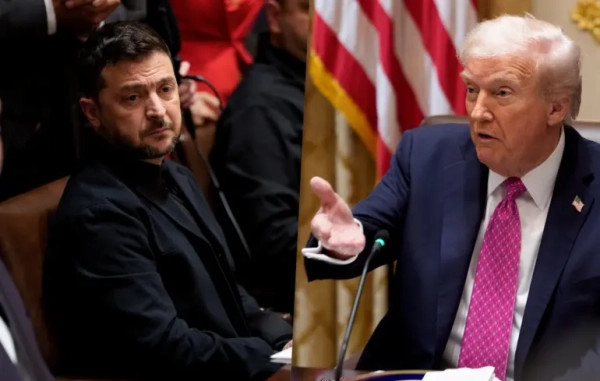
The White House spent the weekend defending sweeping new steel and aluminum tariffs it plans to impose within days, arguing that they’re vital to bringing down the US trade deficit. US allies spent the weekend threatening to retaliate.
Now the prospect of a devastating trade war seems more likely than ever.
A trade war happens when one country puts up a trade barrier, like strict tariffs (which are border taxes on imports), to protect its economy from foreign competition — and another country decides to strike back with its own trade barriers.
In this case, Canada and the European Union are both threatening to retaliate against the US after President Donald Trump announced Thursday that he planned to impose big tariffs on imported steel and aluminum by using an obscure trade law. Those tariffs will hurt the ability of Canada, Germany, and other countries to sell steel and aluminum to the US.
On Friday, European Commission President Jean-Claude Juncker discussed putting tariffs on blue jeans, bourbon, and Harley-Davidson motorcycles, three iconic American exports, in response to Trump’s move. Canadian Prime Minister Justin Trudeau called Trump’s plan “absolutely unacceptable,” and his foreign minister threatened “responsive measures.”
While making the rounds on the Sunday morning talk show circuit, White House trade adviser Peter Navarro sounded unfazed by possible retaliation from US trading partners. He also downplayed concerns that US industries that rely on imported steel and aluminum could pass on increased costs to consumers. “I think the American people are willing to pay a cent-and-a-half more for a 6-pack of beer to have an aluminum and steel industry,” he said on CBS News’s Face the Nation.
Trade wars are a particularly unnerving prospect for many exporters in other countries, since retaliatory actions can spiral out of control. On Saturday Trump tweeted that if the European Union does, in fact, issue retaliatory tariffs, then he will retaliate against their retaliation, by slapping tariffs on European cars. If that happened, it’s possible Europe would once again try to even the score. The cycle could continue indefinitely.
If trade wars continue for a long time, they can have a devastating impact on countries’ economies. They can severely affect entire industries, cause unemployment to spike, and raise the price of vital goods in both or all of the countries involved. And with a president who misguidedly believes trade wars “are good and easy to win,” that worst-case scenario doesn’t seem far-fetched.
The White House isn’t afraid of a trade war. But some Republicans are.
When he appeared on the Sunday talk shows this weekend, Navarro’s message was clear: The Trump administration is very serious about the new border taxes — 25 percent on imported steel, 10 percent on imported aluminum — and it could happen as early as this week.
Navarro confirmed that the administration is not backing down on across-the-board tariffs and would not be making any country-based exceptions.
“As soon as [Trump] starts exempting countries, he has to raise the tariff on everybody else,” Navarro said on Fox News Sunday. “As soon as he exempts one country, his phone starts ringing with the heads of state of other countries.”
He did suggest that there could be exemptions for specific steel or aluminum products that were vital to US businesses, although he offered no specific details.
“There’s a difference between exemptions and country exclusions,” Navarro said on CNN’s State of the Union talk show. “There’ll be an exemption procedure for particular cases … so that business can move forward, but at this point in time, there’ll be no country exclusions.”
On the whole, Navarro appeared entirely unconcerned about the response from Europe, Canada, and others. But many members of Trump’s own party don’t share that confidence. “You’re punishing the American taxpayers, and you are making a huge mistake,” Sen. Lindsey Graham (R-SC), said on Face the Nation in remarks directed at the president.
Graham said that the tariffs would mark a victory for China. While China is the chief source of the global oversupply of steel and aluminum, it currently ships little steel and aluminum to the US because of previously-imposed trade barriers. “China wins when we fight with Europe,” Graham said.
On Thursday, Sen. Pat Roberts (R-KS), the chair of the Senate agriculture committee, said, “Every time you do this you get retaliation. And agriculture is the number one target. I think this is terribly counterproductive … and I’m not very happy.”
Trump might not fully understand the consequences of the tariffs
When Trump boasted on Friday that trade wars are “good and easy to win,” he seemed remarkably flippant about a situation that could deeply affect the US and global economy.
If Europe hits American goods like bourbon and motorcycles with huge tariffs, it could decrease demand for those products and lead to US workers losing their jobs. So Trump’s bid to make American steel great again could end up harming iconic American brands like Harley-Davidson and Jack Daniel’s Tennessee whiskey.
If countries like Canada are looking to hit Trump where it hurts, they could target the manufacturing industry or agricultural exports — the kinds of products that hold enormous symbolic value for Trump’s political base.
Trump’s brash policy-making style could also reduce the odds of striking trade deals that he’s after. The UK and the US have both signaled interest in forming a bilateral trade agreement as the UK prepares to leave the European Union in 2019. But analysts say that Trump’s management of these tariffs could make the UK less inclined to pursue that deal with the US. British Prime Minister Theresa May expressed “deep concern” over the tariffs in a phone call with Trump on Sunday, according to a Downing Street spokesperson.
“I’d question the logic of running into a trade deal with a president who sees trade less as a means of achieving mutual prosperity and more an instrument of war,” Sam Lowe, a trade expert at the Centre for European Reform think tank, told the Guardian.
Even without a trade war, the steel and aluminum tariffs will hurt US industries that rely on steel and aluminum to make their products and it will increase their costs. Companies will then have to choose whether or not to swallow those increased costs or pass them on to the consumer. Automakers, the construction industry, the beer industry, retailers, and others have all come out against the tariffs for this reason.
Jeff Schuster, head of forecasting at consultancy LMC Automotive, told Reuters that already-struggling auto companies would fare poorly with increased steel and aluminum prices.
“I don’t think there would be much appetite to absorb the added cost, nor do I think the consumer is interested in doing so,” he said. The result, according to Schuster, will likely lead to a decline in sales.
If Trump goes through with the tariffs as promised, he’ll win the affection of American steel and aluminum producers and impress the parts of his base eager to see him pursue a nationalist agenda on trade.
The question, in the long run, is whether or not it will be worth the costs.
Sourse: vox.com






